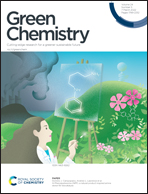Sustainable protocols for direct C–H bond arylation of (hetero)arenes
Abstract
Direct C–H bond arylation of (hetero)arenes is a very convenient approach for the synthesis of a wide variety of molecular targets, including compounds of pharmaceutical interest and π-conjugated small molecules and polymers. Compared to traditional transition metal-promoted cross-coupling reactions, direct C–H arylations best fit the Green Chemistry criteria, particularly in minimization of waste, use of less hazardous chemicals, atom economy, and reduction of unnecessary derivatization steps. Despite the advantages, these reactions still initially suffered from major limitations in terms of sustainable chemistry, i.e., toxic and expensive transition-metal catalysts, toxic and/or hazardous solvents, high temperatures and long reaction times. The increasing attention towards environmentally friendly reaction protocols has boosted studies directed towards the development of sustainable strategies for direct C–H bond arylation of (hetero)arenes. This review offers a critical overview of the research on this topic, focusing on three main aspects: (i) recoverable catalysts; (ii) sustainable solvents; (iii) non-conventional energy sources.

- This article is part of the themed collections: Green Chemistry Reviews and Green Chemistry Reviews


 Please wait while we load your content...
Please wait while we load your content...